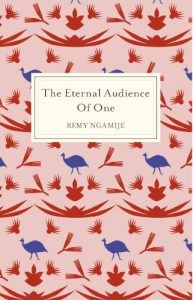With prose that sparkles and pops, Rémy Ngamije’s The Eternal Audience of One is a millennial novel that intricately traces the nuances of immigrant life, writes Mphuthumi Ntabeni.

The Eternal Audience of One
Rémy Ngamije
BlackBird Books, 2019
- ‘Windhoek has three temperatures: hot, mosquito, and fucking cold’—Read an excerpt from The Eternal Audience of One here
- Listen to the new episode of our audio show Read This! featuring Rémy Ngamije’s debut novel, The Eternal Audience of One
The Eternal Audience of One, the debut from Rwandan-born Namibian writer Rémy Ngamije, fits easily into the genre known as the millennial novel. On the international stage, this genre is epitomised by the likes of Conversations With Friends and Normal People, by the Irish writer Sally Rooney, and Queenie, by London-based writer Candice Carty-Williams. Theirs are anxiety-driven, world-weary, navel-gazing and self-deprecating tales of dysfunction, brokenness, disappointment, self-loathing—and soul healing. In what is fast becoming a millennial-bashing trope for certain critics, millennial writers are often censured for not caring for the hierarchies of literature, and for their rootless, narcissistic, frenetic and neurotic narratives. But in other quarters they’re loved, especially for their dramatisation of the postmodern ideological collapse, particularly of the once looming isms of feminism, liberalism and capitalism.
The Eternal Audience of One, and African literature in general, introduces to these topical anchors of millennial fiction the struggles of immigrants (inter-continental, in this book) against muted colonialism, which fits well within a genre marked by lean optimism. The story is minutely drawn out, often humorous in its telling, hiding the pathos behind the narrative. At times its prose sparkles and pops like a good quality champagne. It’s written with a pleasant self delight and an acute consciousness of the mechanisms of language, and often has the feel of a comedy of manners. Its sarcastic tone towards politics, meanwhile, allows it to skilfully traverse through South Africa, Namibia, Rwanda and France; they say sarcasm, as a marker of truth, is the weapon of those who live to the full the contradictions of our era. That defines Séraphin, the protagonist of the novel.
While the book is faithful to the attractive cosmopolitanism of Cape Town, South Africa’s so-called Mother City, as a Capetonian myself I felt the depiction of the city was too often generated from the rose-tinted perspective of an immigrant’s exotic hopes. Sadly, this ensures it misses the opportunity to tell, also, the realities of exclusionary elitism and the general atmosphere of conceit that the majority of Cape Town’s denizens live and breathe. If from the title you suspect that escapism is the propelling force of the novel you’re not far wrong. Séraphin wants to be in places that pulsate with bright lights and the trappings of progress: sensuousness, art, literature, music—all that the late British philosopher Michael Oakeshott starkly called ‘the deadliness of doing’ in city life. We’re never completely certain what he wants, beyond the common hustle for material wealth: to displace a brooding sense of his own extinction? To substitute the life of the void for the novel and exotic? To escape into the sublime? Or is he suspiciously trying to avoid what the Germans call Eigenart, his own inherent peculiarity? But since we also were once young, we somehow get it. We understand the urgent longing for independence, the need for an insulating place of one’s own immediately after leaving varsity. Add to this the need to stave off one’s sense of alienation, especially when in a foreign land—that haunting and pervasive sense of not belonging.
The search for a redeeming response to the suffocating clutches of modern life and the insuperable hegemony of its ruthless economic system is another common factor among millennial novels. They employ words, the last arrows of the hapless, as pokes of revulsion against the quiet and oppressive, heteronormative, capitalist system whose silent wholesale slaughter props up modern societal maladies: xenophobia, ecocide, elitism, racism, colourism, gentrification, sexism, homophobia, and, in the case of Africa, tribalism and invincible superstitions that lead to unnecessary tragedies, like the killing of people who live with albinism. Accordingly, one of the experiences we are treated to in Ngamije’s book is being taken behind the curtain to witness the pressures parents subject their immigrant children to, urging them on in pursuit of worldly success, forcing them to fulfil the collective, tribal hopes of home in return for the sacrifices they made on their behalf. As with many books of immigration, the past here is identified with loss and the future with uncertainty. Writing, meanwhile, becomes part of the battle, caught between restoring broken historical continuity and ruptures required to forge possibilities into future successes.
At times, The Eternal Audience of One is laboured with overworked phrases and too much cleverness. These moments remind me how age is sometimes an imperative ingredient in writing. Millennial authors, including Ngamije, are mostly under thirty-three years, by (disputed) definition. There’s something to be said about producing a book from middle age and upwards, when the writer has acquired qualities of composure, poise and experience so frequently absent in the first novels of young people. Though rich in pace and propulsion, thanks to the use of postmodern pastiche—music, movies, emails, text messages and so on—millennial books can be too crowded, lacking the quietness that comes from the psychological introspection of literary maturity.
Ngamije is at his best when he’s taking the piss out of his narrator, which creates much-needed distance between the story and its protagonist. The writing, generally, is sensuous: but what I noticed is that when the sensuous is toned down a pleasing intellectual and aesthetic conceit shines through. This doesn’t surprise: very few writers—DH Lawrence being their acme—are able to keep the soaring balance between the sensuous, intellectual and aesthetic for very long (and even Lawrence got it very wrong, sometimes).
Ngamije’s writing is also disseminative and compendious. It might appear strange to call such a big book compendious, but I’m talking about how it abbreviates its myriad themes, which are often not given subjective treatment and inward depth. This makes the book, like many millennial novels, feel like a series of vignettes and paradigms depicting the author’s experiences and history, while shying away from demanding introspective development. Among the millennial novels I’ve read, only Rooney’s Normal People and Ottessa Moshfegh’s wonderfully bleak My Year of Rest and Relaxation escape this criticism.
Having said that, if you’re looking for an intelligent escape-and-rescue literary experience, The Eternal Audience of One is your book. It’s an intricate interrogation of exile, homesickness and the alienation of immigrant lives. It’s also a brilliant postmodern take on how the arts—writing and music in particular—can deliver a troubled mind into gathering and holding all that our senses, by experience, have transmuted into consciousness, which, in a nutshell, is the greater purpose of our lives in this world. In this book, southern Africa has thrown its hat into the millennial fiction ring in a manner that is on par with its international peers. We have in Rémy Ngamije a rising literary star to watch.
- Mphuthumi Ntabeni is the author of the historical novel The Broken River Tent.






One thought on “Southern Africa throws its hat into the millennial fiction ring—Mphuthumi Ntabeni reviews The Eternal Audience of One, the debut novel by Rwandan–Namibian author Rémy Ngamije”